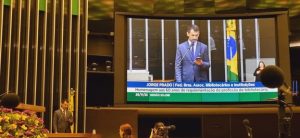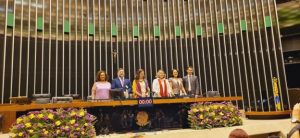 On November 29, Dr. Jorge Moisés Kroll do Prado, President of the Brazilian Federation of Associations of Librarians, Information Scientists and Institutions (FEBAB), spoke in support of librarians and the 60th anniversary of the regulation of the library profession in Brazil at the Chamber of Deputies of the National Congress of Brazil in Brasilia, the country’s capital.
On November 29, Dr. Jorge Moisés Kroll do Prado, President of the Brazilian Federation of Associations of Librarians, Information Scientists and Institutions (FEBAB), spoke in support of librarians and the 60th anniversary of the regulation of the library profession in Brazil at the Chamber of Deputies of the National Congress of Brazil in Brasilia, the country’s capital.
Few librarians have been able to advocate for libraries in their country’s Congress. This is a huge win for libraries and librarians in Brazil and globally. I’ve collaborated with Dr. Prado for a long time and interviewed him about this achievement. I hope his answers help build strategies to advocate for libraries in countries around the world.
What was the purpose of your library advocacy at the National Congress of Brazil?
I went to the Chamber of Deputies of the National Congress of Brazil in Brasilia, invited by the Federal Council of Librarianship. The Chamber of Deputies is a federal legislative body and the lower house of the National Congress of Brazil.
We had two activities: on Monday, November 28, I spoke at a public hearing for the universalization law for school libraries and on Tuesday, November 29, I spoke at the solemn session for the 60th anniversary of the regulation of the librarian profession in Brazil.
The law for university libraries is now 12 years old and still unfulfilled. We only have 36.5% of Brazilian schools with libraries, which does not mean a librarian is in these spaces. The public hearing on November 28 outlined the next steps in fulfilling this law. I was joined by Prof. Dr. Maria das Graças Castro Monteiro, chair of the Brazilian School Libraries Commission of FEBAB. A national campaign (#SouBibliotecaEscolar in Portuguese, #IamSchoolLibrary) has mobilized associations, regional councils, society, and the government in the Brazilian states to carry out regional articulations. Our country is vast, and each state has a different socioeconomic and political particularity.
The solemn session on November 29 for the 60 years of regulation of our profession is an outstanding achievement. The law was created by librarian Laura Russo, FEBAB’s first president. In Brazil, we only have 69 regulated professions and this context, in a way, makes it easier for us to guarantee a speaking slot in Congress.
For a few years now, FEBAB has been increasing close collaborations with other librarian entities in Brazil, which is fundamental. Despite being a big country, librarians are a small group. Therefore, every union and collective effort is essential.

How were you able to secure such opportunities?
The Federal Deputy Fernanda Melchionna and the Federal Council of Librarianship invited me to speak. Melchionna, the first librarian elected deputy in our country, is one of the leaders of the Parliamentary Group for Books, Reading and Writing launched in 2019 with the support of 220 deputies.
FEBAB has continuously collaborated with Melchionna securing her support. Additionally, we collaborate with other library entities in Brazil. Our delegation was strong, reflecting our work in unity. The presidents of the regional library councils, a representative of the National Fund for the Development of Education, and the federal deputies Fernanda Melchionna and Erika Kokay (FEBAB’s partner in several initiatives) were all present with us in Congress. From FEBAB, at the public hearing on school libraries on November 28, I was joined by Prof. Dr. Maria das Graças Monteiro Castro, chair of the Brazilian Commission on School Libraries of FEBAB. At the solemn session on November 29, I was the only speaker representing libraries.
What did you speak about?
During the solemn session, I spoke about the hard work of Laura Russo. She was a very important librarian who worked hard for the development of our profession in Brazil. She was the first president of FEBAB in 1959 and the first president of the Federal Council of Librarianship in 1966. The law that regulates the profession was created due to her work. I also mentioned that the achievements from these six decades result from the advocacy of our associations, regional councils, and unions. It is of fundamental importance that librarians continue to engage and support this movement so that we may have new achievements in the next 60 years.
I brought some specific data about the situation during the public hearing on school libraries. In Brazil, according to preliminary data from the Library Census that FEBAB has been carrying out since April of this year, only 13% of the professionals are working in schools. It is necessary to increase the number of people trained in the courses but in line with the required profile of the school librarian that we need to build. I also mentioned that our fight cannot be only about access to books but information as a whole, and this happens in a space with adequate and accessible infrastructure and with a dedicated librarian. We need financial investment, guidelines, and models for school library networks, and we need to design the library according to the learning level of the students.
What would you recommend to librarians that would like to have an appointment at such an important and visible forum in their countries?
The first thing I recommend is to engage with the profession’s different groups and entities. They continuously follow up and work closely with local and federal governments, universities, and other organizations. They continuously carry out projects in different areas that need the support of professionals. You may not be available to participate in the management team, but it is essential to cooperate with their actions.
IFLA has produced relevant materials: the 10 Minutes International Librarian action tips, which are advocacy tips that you can practice in any library. Here in Brazil, in partnership with SP Leituras, we translate it into Portuguese and publish it on FEBAB’s social media. These materials can be adapted regionally or even translated into languages other than the official IFLA languages.
By Loida Garcia-Febo, International Library Consultant and CPDWL Advisor